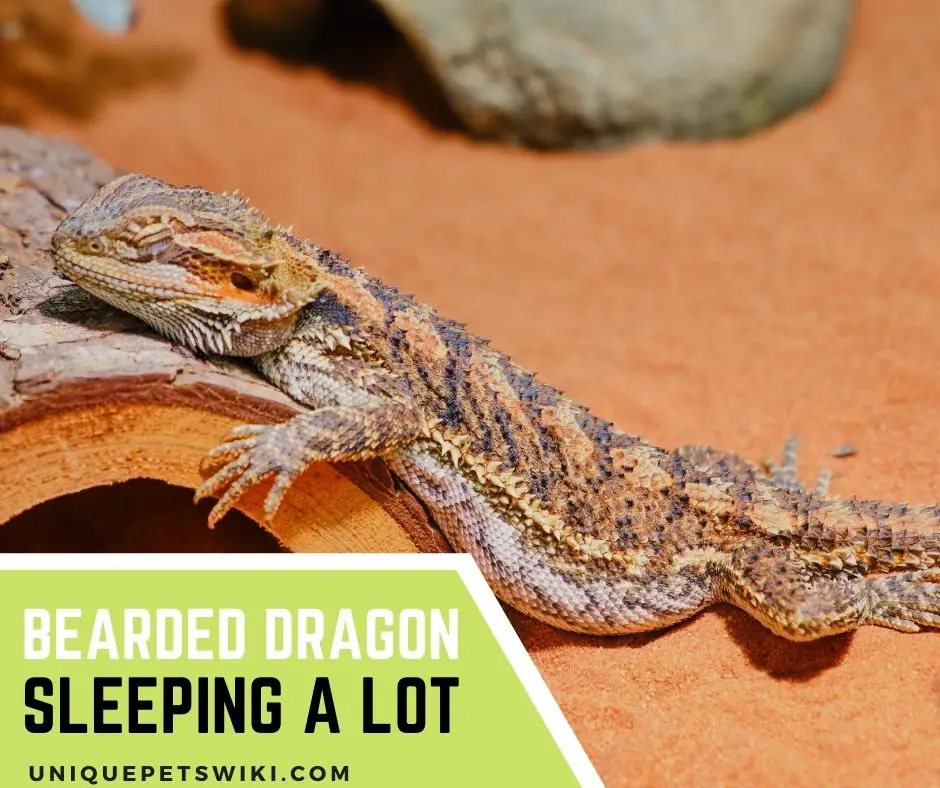Ever wondered why your bearded dragon sleeping a lot? It could be normal and it could also be that something is wrong with your beardie which you should worry about. Read on to learn more.
Every bearded dragon needs to rest, but you should be alarmed if you notice yours sleeping a lot more than usual. Bearded dragons may begin to sleep abnormally, and in some cases, all day, for a variety of causes.
We’ll look at all of the multiple reasons why your bearded lizard is sleeping more than normal in this post. So you can figure out why this is happening and whether or not you need to act immediately.
This article has been reviewed by Dr. Dilber. Read more about our knowledge control process here.
Contents
Bearded Dragon Sleeping How Much Is Too Much?
If you own a bearded dragon, you must recognize how much sleep it requires on a regular basis. On average, Bearded dragons need between eight to twelve hours of sleep per day. More than this around time can be considered as sleeping a lot.
It is optimal for a continuous pattern that closely reflects the biological day-night cycle for your bearded friend. Allowing your bearded dragon to sleep for the same amount of time every day, preferably at the same hour, will help in the development of a good, healthy sleeping pattern.
In most circumstances, if your bearded dragon sleeps a lot, then yes, it’s bad. Baby beardies sleep longer than their adult counterparts. Since It is normal for babies to sleep for long periods of time unless their sleeping pattern is caused by environmental changes.
Bearded dragons are incredibly sensitive to changes in their environment. It could be a shift in place or a change in temperature and their behavior will be affected by such a drastic transformation.
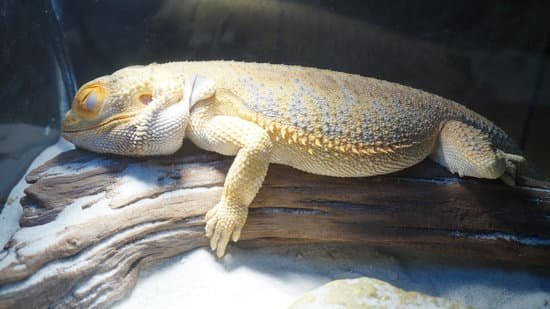
8 Causes Make Bearded Dragon Sleeping A Lot
There are a number of causes why Bearded Dragons sleep so much, and not all of them are bad. They sleep a lot because, for example, they are adjusting to their new surroundings, or brumation, or shedding.
Furthermore, it is totally normal to sleep for long periods of time in order to avoid freezing temperatures and lack of food and drink, comparable to brumation.
Your Bearded Dragon Could Be Starting To Brumate
Brumating (a hibernation-like state that many cold-blooded animals go through annually) is a part of a bearded dragon’s life. This isn’t something that all beardies do, but for the first time that they do can be a stressful event for many owners.
Don’t worry, though, it’s a completely normal event done just to ensure their survival in the wild, this is to make it through the winter, when there is less live food and vegetation.
As a result, they’ll sleep it off by excavating a hole and waiting for spring to arrive. They’re surviving on their own reserves of food.
Other Symptoms And Signs To Identify Brumate
You can detect if your bearded dragon is brumating by looking for the following signs:
● Getting more sleep
● Appetite was reduced.
● Getting to bed sooner
● Taking refuge in the shade
● Less defecating (due to eating less)
What Should Owners Do When Bearded Dragon Is Starting Brumate
You won’t be able to stop your dragon from brumation once it has started. Instead of attempting to wake up your dragon, concentrate on ways to make the process as healthy as possible for them.
Turn the heat and lights down, and make sure they have a clean water dish and a dark, secure hiding spot.
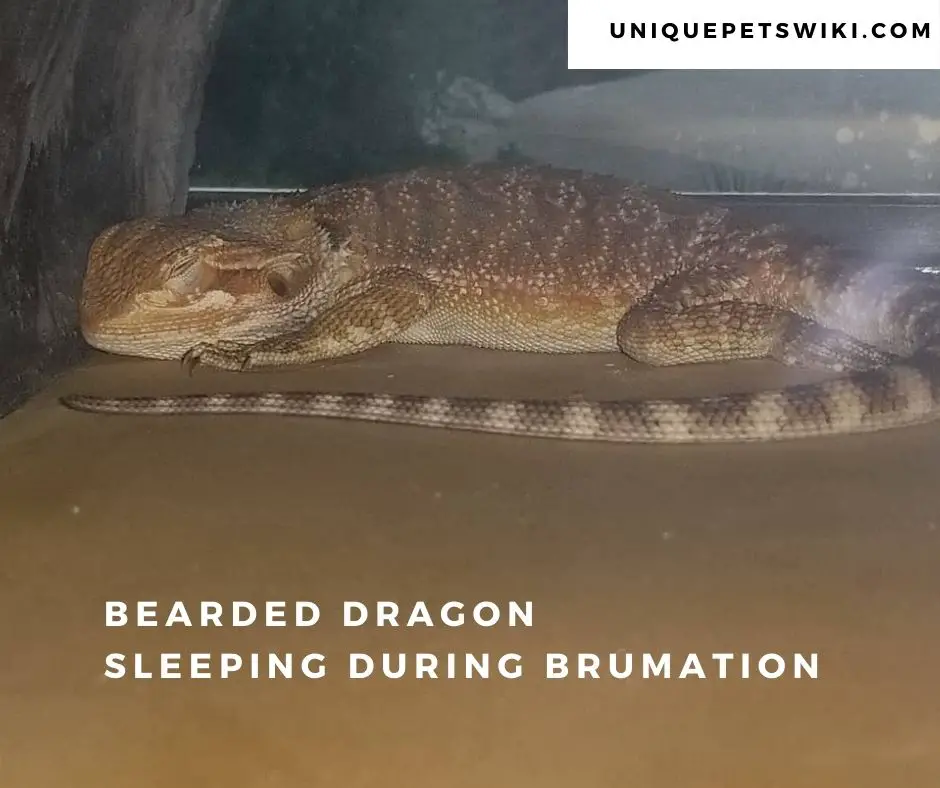
Low Tank Temperatures
Low tank temperatures are another reason why Bearded Dragons sleep for such a long time. This is because of the fact that bearded dragons are native to Australia’s dry, desert-like environments.
Given their ectotherms, or cold-blooded animals, they are accustomed to basking in the sun in the wild. But because the desert cools off significantly at night, dragons have grown accustomed to resting at temperatures as low as seventy degrees, sometimes even lower.
Other Symptoms And Signs To Identify Tank Temperatures
Check the temperature in your Beardie’s terrarium to make sure it’s between 75-85 degrees Fahrenheit (24-29°C), with a basking spot that reaches 110 degrees Fahrenheit (43°C) during the day, anything lower or higher is considered bad, have a thermometer ready in the tank.
The environment should be around 70-75 degrees Fahrenheit (21-29°C) at night, but not below 66 degrees Fahrenheit (18°C) at any time.
What Should Owners Do When Bearded Dragon’s Tank Is Cold
● Switch out the tank cover
It can contribute to the buildup of humidity in the tank if the tank lid has no ventilation or is made of materials that attract moisture.
● Dispose of the Water Bowl
By relocating the water dish away from the basking lamp and into a cooler place, you can lessen the quantity of humidity. If this fails, try removing the bowl from the tank anytime your bearded dragon is not using it.
● Remove the Basking Bulb and replace it with a new one
Purchasing a basking bulb that is somewhat hotter than your present lamps, such as a 100-watt or 75-watt basking bulb, can help to burn off excess moisture in the tank.
Improper Lighting Cycle: It’s Dark Out
Bearded dragons, unlike other lizards, like to sleep in the dark at night. That implies that if it’s a really dark, rainy day, your bearded dragon can get a little extra tired (or sleepy).
Other Symptoms And Signs To Identify Wrong lighting
One of the reasons is if the tank is located in a dark location or corner. Further, if it is often wet and dark where you live, this may contribute to why your bearded dragon sleeps so much!
Wrong lighting also has something to do with wrong heat and temperature. Lighting provides heat for beardies, so another sign to look out for is if they’re lethargic or not active.
The tanks of bearded dragons should mimic their natural environment including the day and night cycle, which is 12 hours of daytime and the half for nighttime. There might be a problem with your lighting, it may be less than 12 hours, or it’s not bright enough.
It can eventually cause other health risks for the beardies such as Metabolic Bone Disease (MBD) or in worst cases, heart failure.
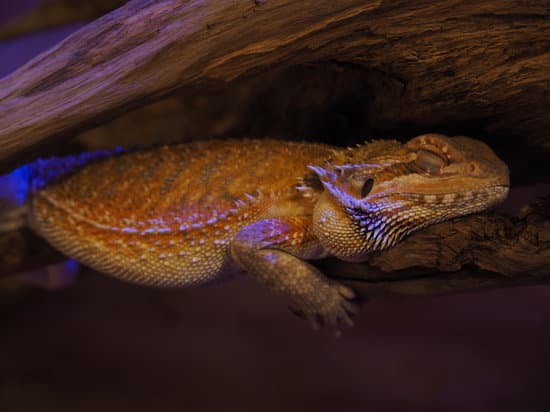
What Should Owners Do When Wrong lighting
A bearded dragon’s tank must be located in an area with adequate lighting. It’s not too hot or too cold. Place a colorless, halogen bulb that’s 40-100 watts, inside the tank as well.
In order for them to get back to their sleeping schedule, the room should not be too bright or too dark.
Your Bearded Dragon Is Sick
One of the numerous reasons your bearded dragon sleeps so much is that it is sick. A sick dragon does not move much, stays in one place for days on end, and appears lethargic.
A bearded dragon acting drowsy could be an indication of a major health problem resulting in a disrupted sleep cycle.
Other Symptoms And Signs Unhealthy Bearded Dragon
Signs that your bearded dragon is sick are obesity or malnourished appearance, mouth hanging open, eyes sunken, discoloration of stomach, lethargy, loss of appetite, tail or limbs are swollen.
What Should Owners Do When Bearded Dragon Is Sick
Keep your bearded dragon as comfortable as possible. Make sure your bearded dragon’s enclosure is in good condition if it’s sick. Above all, ensure that its tank is warm and that it has access to food, even if its illness prevents it from moving about much.
They also require a lot of water to help their bodies heal from various ailments. Replace the water in your bearded dragon’s bowl on a daily basis to ensure that your pet has plenty of clean drinking water.
Keep an eye out for indicators of pain. Keep an eye out for indicators of discomfort or worsened disease if your bearded dragon is sick and you’re trying to care for it.
When caring for a sick bearded dragon, keep an eye out for the indicated signs and visit your veterinarian if they develop or worsen over time. Also, provide as much comfort as you can.
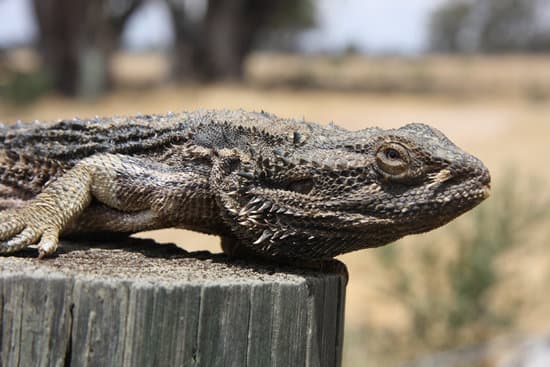
Your Bearded Dragon Is Stressed
Stress has a negative impact towards anyone, especially for bearded dragons. Stress can sometimes cause other illnesses which can be why your bearded dragon sleeps a lot.
Other Symptoms And Signs
Low activity, lethargy, and increased stinking excrement can all be symptoms of stress, which can occur for a variety of reasons. Loss of hunger, dark coloring, and aggressive behavior are all symptoms that your dragon is under stress.
Note: Dark coloring can appear on its belly and chin which are often referred to as “stress marks”. They should go away once stress factors are gone.
What Should Owners Do
Handling should be reduced. When a dragon is agitated, especially after a relocation, it’s best to leave it alone for a while until it can adjust for the meantime.
● Make A Head Stroke
This is something that a lot of people do with their bearded dragons. Gently stroke your bearded dragon’s head from the snout to the crown with one finger, this puts them at ease and gives them a sense of security.
● Get Rid of Sensory Overload
Covering the enclosure with a blanket or cover can be useful at times. This reduces the amount of light and noise that your bearded dragon is exposed to, and make sure the tank is kept at a comfortable temperature.
Other things you can do are minimize the handling of bearded dragons, offer food daily, don’t place another beardie inside the tank, and give them a warm bath. Make sure your voice is welcoming and pleasant since this can also help them.
Your Bearded Dragon Is Shedding
When a bearded dragon is shedding, it is more likely to be seen sleeping. Shedding is something that requires energy to renew the body’s tissues and cells. Dragons become lethargic and sleepy during shedding. This helps them to save energy.
Shedding can be a traumatic occurrence for bearded dragons since, unlike snakes, they shed their skin in patches over a much longer length of time. This frequently results in them becoming irritated, irritable, and frequently hiding.
Shedding also requires a lot of energy which they have to rub their old skin against rocks so it can peel off. During these times, the beardie will be less active before, during, and after the shedding process.
When it’s time to shed, the skin will become extremely tight. There will always be a shift in skin color, it will always be dull and will turn white before being shed. Don’t be concerned; this is very normal.
The most recommended thing you can do is to leave it alone and let him do the shedding. They’ve developed through millions of years to not require baths, oils, or any of the other things.
Having the proper arrangement of the tank, as well as a variety of surfaces within the enclosure, to greatly help the shedding process. Owners should make an effort to place the following things in the tank:
● Rocks
● Branches
● Slate and
● Starch
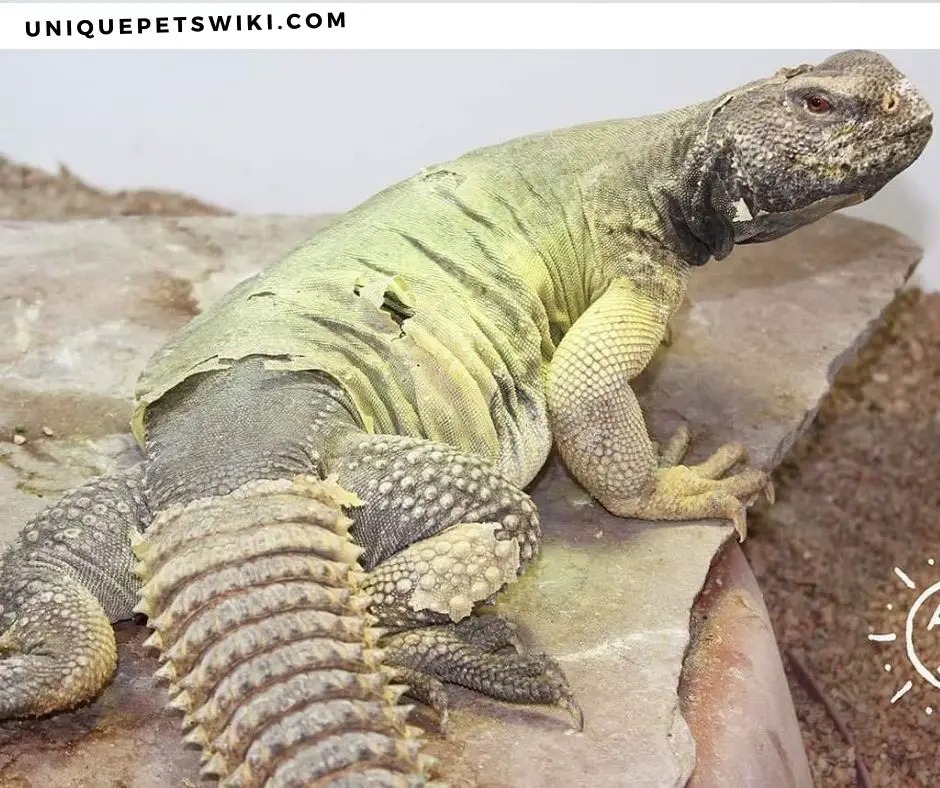
This is to have rough surfaces for your bearded dragon to peel its skin off to. Owners should also receive a proper diet, especially water.
The enclosure set up should also be optimal such as receiving 12 hours of light, humidity levels of 30%-40%, Basking temperatures of 95°F to 105°F, and cooling side of 75°F to 80°F.
Your Bearded Dragon Dehydration
Bearded dragons are prone to dehydration, which can cause them to become lethargic and sleep more than usual. Dehydrated dragons sleep more due to droopy eyes and low metabolism in their body.
Dehydration is frequently caused by beardies refusing to drink from the water bowl you give, as many beardies will not do so naturally.
The quality of a bearded dragon’s skin will show whether or not it is dehydrated. When you gently pinch the bearded dragon’s skin, it should instantly return to normal, but when the skin is dry, it will stretch back slowly.
Mild dehydration can be treated at home with the right information and care. Consult a veterinarian if your bearded dragon is exhibiting unusual symptoms, such as a complete lack of activity.
Your Bearded Dragon Isn’t Being Offered Enough Food
Because food shortage in nature indicates that the seasons are changing, wild bearded dragons that are adjusting to captivity will enter brumation as soon as food becomes scarce.
If you forget to feed your pet, or if they haven’t eaten enough, their tiny bodies may need a nap to stay alive. Check to see if you’re feeding the young one enough.
The indications and symptoms of a hungry bearded dragon include a lack of energy and, of course, sleeping more than usual.
To avoid this problem, feed Adult bearded dragons a diet that is primarily composed of fruits and vegetables, with only 20% protein, so they only require protein around twice a week. While a baby bearded dragon eats half of what an adult does.
A calcium supplement combined with their protein is also very useful for bearded dragons.
Should Owners Wake A Sleeping Bearded Dragon?
Owners may need to wake their lizards from their naps for a variety of reasons, including cleaning the cage, administering medication, or checking on sick bearded dragons. It’s usually simple to get these creatures to wake up.
The only cases where you should not wake up a sleeping bearded dragon is when it’s undergoing brumation, when it’s sick, when it’s shedding, and when it’s stressed. But for other cases, it should be fine.
Final Sentences
You know your bearded dragon, so don’t be alarmed if you notice a few sluggish days followed by normally busy days. This is normal behavior for bearded dragons.
Your bearded dragon, like you, may go through periods of inactivity that you are unable to manage. The greatest thing you can do is keep an eye on them, provide them with adequate food and water, and control their light hours and tank temperature.
If it only lasts a day or two, don’t be concerned, but know when to get help from a veterinarian. Like you, I want to see your scaly best buddy live a long and happy life.
